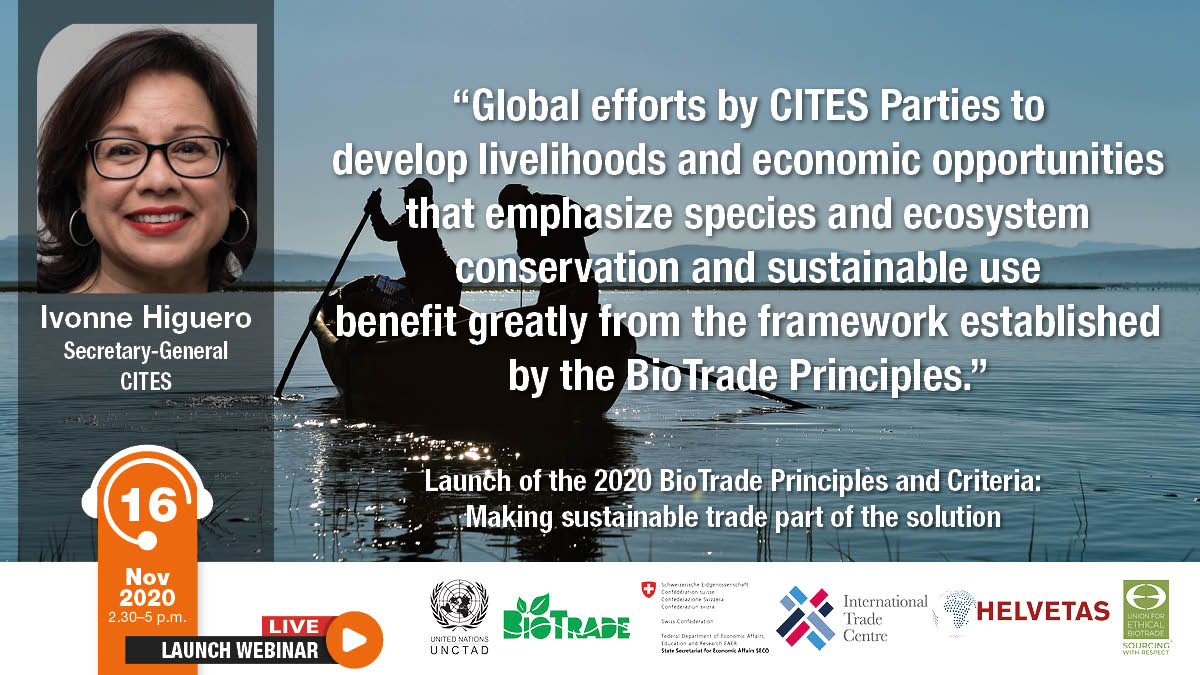BioTrade Revised Principles and Criteria launch
16 November 2020 14.30h CET
CITES Secretary-General Opening Remarks

Excellencies, distinguished colleagues, ladies and gentlemen,
I am very grateful for your invitation to speak at this event marking the launch of the revised Principles and Criteria for the Biotrade Initiative. I extend my heartfelt congratulations to UNCTAD for their hard work in carrying this initiative forward. I believe this will contribute significantly to our shared sustainability goals and brings us closer to our common objectives.
I would like to use this opportunity to remember our dear UNCTAD colleague Bonapas Onguglo, who was a formidable partner during many years of our long cooperation with UNCTAD. I also want to thank all the dedicated Biotrade colleagues, donors and partners for their tireless efforts. We are also grateful to the Government of Switzerland and to SECO for supporting this initiative since it first began.
For twenty years now, and all the more so after the signing of a memorandum of understanding between UNCTAD and the CITES Secretariat in 2010, our collaboration on the BioTrade Initiative has been steady, fruitful and inspiring. From our perspective, it undeniably has also served the effective implementation of the Convention.
The BioTrade Principles and Criteria have incorporated the key CITES principles: legality, sustainability and traceability. This has clearly benefited Parties. The Principles and Criteria provide Member States with practical guidelines for the organization of strategic value-chains. This supports the CITES framework for conservation and sustainable use of wildlife.

UNCTAD’s involvement in the CITES Livelihoods Programme has served to strengthen our understanding of the links between local communities, sustainable use of wildlife, and species’ conservation. The 12 case studies developed for CITES Parties at CoP18, with extensive input from UNCTAD BioTrade, are a tangible example of this.
These studies looked at the commercial use of various CITES-listed species, and the effects of this regulated trade on national economies, the law-abiding private sector, and the livelihoods of rural peoples living side by side with wildlife.
The resulting studies are detailed best practices in the trade and use of wildlife in a way that benefits both rural and indigenous livelihoods, and the long-term conservation of prized species of wild fauna and flora.
More recently, our joint work on the launch of UNCTAD’s Blue BioTrade Project for Queen Conch in the Caribbean showed, once more, the alignment of our objectives.
In the context of CITES, prerequisites for trade in listed species, such as the obligation to perform Non-Detriment Findings and Legal Acquisition Findings, are key pillars to ensure the sustainability of international wildlife trade. The importance of these processes is fully echoed in various BioTrade Principles. This is particularly clear in the wording of principles looking at – quote - ‘compliance with national and international regulations’, and at ‘Clarity about land tenure, use and access to natural resources and knowledge.’
The substance of these principles fully endorses CITES Parties’ efforts to keep trade legal and traceable; and to demonstrate that sustainable use of biodiversity by rural and indigenous communities who depend on it the most can be a powerful conservation tool.
The BioTrade principles have also given much weight to a crucial message that is central to the work of CITES: that of the genuine link between well-managed, sustainable trade in wildlife, and the conservation of vulnerable and valuable species.
By fostering the involvement of private actors in the establishment of a sustainable model for the use of biodiversity, the BioTrade initiative supports the broad goals of CITES and other Biodiversity-related Conventions.
It does so by seeking to give local communities a bigger stake in the conservation of the species and ecosystems upon which their incomes and well-being may depend. The Principles and Criteria also lay out a roadmap for regulators and private economic actors to prioritize sustainability, an effort we both see as crucially important.
UNCTAD’s commitment to renew and update the BioTrade Principles and Criteria underscores your commitment to adapt to the pressing challenges we face. I have no doubt that, as we seek to establish a Global Framework for Biodiversity that can respond to the multiple planetary emergencies of this decade, these updated Principles will be of great value. Now more than ever, we must work together to establish a blueprint for a more balanced relationship with nature. And we must do so while remaining grounded in reality without forgetting that we will always rely on biodiversity to meet our most basic needs.
In the CITES’ Strategic Vision, in line with the SDGs, we hope for a future where, through implementation of the Convention and other MEAs, a sustainable and legal international wildlife trade contributes both to species conservation and to the livelihoods, incomes and well-being of people around the world. I believe that initiatives and programmes launched under the auspices of the BioTrade Principles and Criteria can serve as a roadmap to get there and contribute to making that vision a reality.
Thank you and I look forward to listening to the presentations in this webinar.